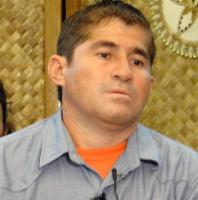 José Salvador Alvarenga, the fisherman who apparently drifted for 13 months at sea in open boat, has been released from the hospital in the Marshall Islands. How is it possible that he could have survived for over a year, while drifting more than 6,000 miles across the Pacific Ocean? Why didn’t he die of scurvy, like so many sailors on long voyages under much better conditions? Scurvy can be a very serious illness if one is without Vitamin C for more than a few months. During the 18th century, for example, scurvy killed more British sailors than enemy action.
José Salvador Alvarenga, the fisherman who apparently drifted for 13 months at sea in open boat, has been released from the hospital in the Marshall Islands. How is it possible that he could have survived for over a year, while drifting more than 6,000 miles across the Pacific Ocean? Why didn’t he die of scurvy, like so many sailors on long voyages under much better conditions? Scurvy can be a very serious illness if one is without Vitamin C for more than a few months. During the 18th century, for example, scurvy killed more British sailors than enemy action.
The Associated Press spoke with Claude Piantadosi, a professor of medicine at Duke University and author of the book The Biology of Human Survival, and asked just these questions.
Q: Without fruit and vegetables, wouldn’t he have developed scurvy?
A: Actually, unlike humans, birds and turtles make their own vitamin C, so fresh meat from those creatures, especially the livers, would provide sufficient vitamin C to prevent scurvy. British sailors used to get scurvy because they ate preserved meat which had oxidized and lost its vitamin C.
Q: There’s some suggestion that Alvarenga was a large man before he left. Would being overweight provide an advantage?
A: It would be a significant advantage. He could live off his own body fat and muscle for a long time, so long as he was able to get some water, vitamins, micronutrients and a little protein.
Q: Didn’t he look too healthy, even a little bloated, when he arrived?
A: The appearances of malnutrition can manifest differently depending on how short you are on calories or protein. Some underfed children in Africa look like stick figures, others get swollen. It’s only in end stage starvation that people get that really emaciated appearance.
Q: Alvarenga seemed to give confused and contradictory answers to authorities. What kind of psychological effects would such a journey have?
A: I’m not an expert in psychiatry, but we all have the feature of resilience. It can be trained or even learned on the fly. For instance, soldiers learn to deal with combat horrors. Presumably he was out on the ocean every day as a fisherman before he went missing, so he would have been familiar with the environment and with adapting his behaviour to the elements.
If he had nutritional deficiencies, he may have developed some dementia or other syndromes which compromised his mental state. I’m not surprised that some of the answers he gave were a bit off and he wasn’t able to remember things.
Q: How long would it take to recover from a voyage like this?
A: Hydration can be restored in just a day or two. Re-feeding can be tricky after a long period of starvation, as the body can lose the ability to absorb nutrients. Muscle rehabilitation and physical therapy can take several weeks.
Q: Bottom line — is Alvarenga’s story plausible?
A: Yes. It’s unusual to say the least. But reports out of Mexico indicate he did go missing in late 2012. As we have gotten more information, it’s probably likely that he did survive at sea for 13 months.

Glad to hear that being overweight might allow one to survive much longer at sea. At least a few extra pounds is good for something. 🙂
I noticed that too. It puts a whole new light on going on a diet.
Some folks need to read Heyerdal’s KON TIKI.
They planned it, they caught the current and sailed to their destination.
the currents do incredible things.
Well, this is na incredible story. Much better than “Pi Patel”. This proves that the sea stil is a enigmatic and surprising throughout the ages, and despite all technonogy we are available to us today, some things never change.